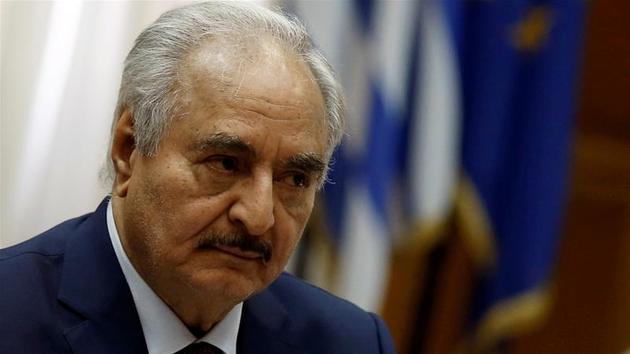The commander in chief of the Libyan National Army (LNA), Marshal Khalifa Haftar, proclaimed himself the supreme ruler of Libya and announced the transfer of power in the country to the military. During the appeal, which was distributed by the LNA office on April 27, the marshal announced the need to break the agreement reached in 2015 in Shirat, as a result of which the Government of National Accord (PNC) was formed in the country.
Haftar considers the PNS to be a puppet government, assuring the world community that ordinary Libyans are ready to support him and are determined to restore Libyan statehood together. Meanwhile, outside Libya, the position of the commander in chief of the LNA is less strong. Shuttle diplomacy of General Haftar showed a lack of interest in it from world leaders. Repeated visits to Moscow have been inconclusive. The closest allies of Field Marshal Egypt, the UAE also refrain from any high-profile statements, limiting themselves to military support. The EU is extremely skeptical of Haftar, as he does not hide his belligerent aspirations to overthrow the PNS by violent means.
Haftar's goal is unchanged - to take Tripoli. Only after that he is ready to talk about the creation of fundamentally new authorities in Libya and the holding of elections. Refusing to cooperate with the PNS and the proposal to take the post of Minister of Defense, Haftar demonstrated a peculiar refusal to establish secular power in Libya. Therefore, already now, the EU and Turkey are accusing the field marshal of striving to create a military dictatorship, ignoring the results of the Berlin Conference on Libya, held in January.
Haftar hopes to legitimize his power by consolidating in most of Libya. However, this is extremely problematic, given that he does not have a full-fledged army. Haftar is resorting to the help of foreign mercenaries, so his army can hardly be called national. The tribal militias, which form the basis of his armed forces, often carry out arrests and confiscation of property of Haftar’s opponents, often accompanied by looting.
Mercenaries, militias, in some cases gang formations - the reality of the LNA. It is difficult to manage such a motley army, it is even more difficult to trust, because you have to constantly fear that it might scatter. Such an army constantly needs to set ever new goals, investing huge financial resources.
In the West, in the actions of Haftar, they see the features of the overthrown Muammar Gaddafi. An authoritarian management style, uncompromisingness, determination. Haftar in the past - one of the commanders of Gaddafi. While the leader of the Libyan Jamahiriya during the war with Chad in 1987 did not turn his back on his commander in chief, Haftar was one of the military closest to Gaddafi.
In Washington, the field marshal’s identity is also unpopular, since after 20 years in the United States, he could collaborate with the CIA and therefore may have information that the West would not want to make public.
Haftar gives no guarantees to anyone; his policy is extremely slurred. He does not say anything about the post-war settlement in Libya, refrains from commenting on issues of cooperation in the oil and gas industry and other trade and financial agreements. Today, neither the West, nor Russia, nor Turkey are ready to question the legitimacy of the leadership of the PNS, since the UN put its hand to the creation of an interim Libyan government.
The Libyan state border is not controlled, which allows for the supply of weapons and drugs to the region, it is easy to block migration flows, as well as the export of values or resources. In the event of the victory of Haftar, it is not clear who will restore Libya, although many expect to receive income from the restoration of the country.






